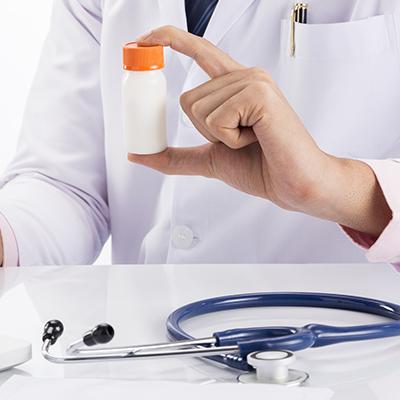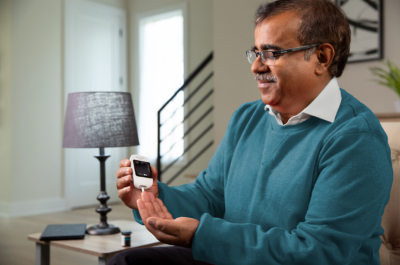Stay healthy during COVID-19
Learn more about the safety measures by International Diabetes Federation (IDF) and World Health Organisation (WHO) against COVID-19 for people living with diabetes.
Read MoreSimple tool to understand your results
The Accu-Chek® 360° Testing in Pairs Tool- a simple, 7-day paper tool See how the things you do affect your blood glucose Accu-Chek 360° Testing in Pairs is a simple tool that helps you track your blood glucose before and after a specific meal, exercise or other event. Use it when you want to focus on just one thing in your daily eating habits or routine. For just 7 days, see how the things you do affect your blood glucose and what works for you. Food/Drinks....
Read MoreTransitions: From Orals to Insulin
Insulin and type 2 diabetes: 5 facts you should know Has your healthcare provider talked to you about insulin? For many people, this can bring on mixed feelings and questions—often based on myths that simply are not true. Here are 5 facts to keep in mind. Diabetes is an insulin problem, not a sugar problem. After all, sugar doesn't cause diabetes. People with type 2 diabetes don't manufacture enough insulin, or their bodies can't use it properly, so they're unable to process the food they take in.1...
Read MoreTreating Low BG
Low blood glucose: Know the signs and steps to take You may recognize the feeling—feeling hungry, dizzy, sweaty or just a little bit "off." These signs of hypoglycaemia, or low blood glucose, mean it's time to take action. What causes low blood glucose? For most people, low blood glucose refers to anything below 4.0 mmol/L , although your number may be different.1 Low blood glucose can be caused by taking too much medication, not having enough to eat or exercising. In fact, hypoglycaemia can occur up to 12 hours after you've been...
Read MoreTips for Making Testing Easier
Whether you check your blood glucose level once a week, once a day, or 6 times a day, learning how to make testing easy and less painful may inspire you to test more often. For people with diabetes, the knowledge that you gain from testing is the key to staying in control of your health. It helps you make informed decisions about medicine, food, and exercise. It helps you cope with the day-to-day demands of living with diabetes, you’ll feel better each day, and you’ll lower your risk for future diabetes complications.1 Here are some tips for getting the best results possible. A guide...
Read MorePractice #GlucoVigilance during these times to be in range
Background: The current times are beyond anything we have ever experienced. During these unprecedented times, we all should put our health on priority and exercise caution. Even more so, if one has diabetes. People with uncontrolled diabetes are at a higher risk, due to lower immune response.1,2 WHO has raised an advisory and has suggested that patients with chronic ailments like cardiovascular diseases, diabetes, hypertension, chronic respiratory diseases and cancer are more prone to severe illnesses as compared to others during these times.3 Hence, it is extremely important for...
Read MoreSimple tool to understand your results
The Accu-Chek® 360° Testing in Pairs Tool- a simple, 7-day paper tool See how the things you do affect your blood glucose Accu-Chek 360° Testing in Pairs is a simple tool that helps you track your blood glucose before and after a specific meal, exercise or other event. Use it when you want to focus on just one thing in your daily eating habits or routine. For just 7 days, see how the things you do affect your blood glucose and what works for you. Food/Drinks....
Read MoreTransitions: From Orals to Insulin
Insulin and type 2 diabetes: 5 facts you should know Has your healthcare provider talked to you about insulin? For many people, this can bring on mixed feelings and questions—often based on myths that simply are not true. Here are 5 facts to keep in mind. Diabetes is an insulin problem, not a sugar problem. After all, sugar doesn't cause diabetes. People with type 2 diabetes don't manufacture enough insulin, or their bodies can't use it properly, so they're unable to process the food they take in.1...
Read MoreTreating Low BG
Low blood glucose: Know the signs and steps to take You may recognize the feeling—feeling hungry, dizzy, sweaty or just a little bit "off." These signs of hypoglycaemia, or low blood glucose, mean it's time to take action. What causes low blood glucose? For most people, low blood glucose refers to anything below 4.0 mmol/L , although your number may be different.1 Low blood glucose can be caused by taking too much medication, not having enough to eat or exercising. In fact, hypoglycaemia can occur up to 12 hours after you've been...
Read MoreTips for Making Testing Easier
Whether you check your blood glucose level once a week, once a day, or 6 times a day, learning how to make testing easy and less painful may inspire you to test more often. For people with diabetes, the knowledge that you gain from testing is the key to staying in control of your health. It helps you make informed decisions about medicine, food, and exercise. It helps you cope with the day-to-day demands of living with diabetes, you’ll feel better each day, and you’ll lower your risk for future diabetes complications.1 Here are some tips for getting the best results possible. A guide...
Read MorePractice #GlucoVigilance during these times to be in range
Background: The current times are beyond anything we have ever experienced. During these unprecedented times, we all should put our health on priority and exercise caution. Even more so, if one has diabetes. People with uncontrolled diabetes are at a higher risk, due to lower immune response.1,2 WHO has raised an advisory and has suggested that patients with chronic ailments like cardiovascular diseases, diabetes, hypertension, chronic respiratory diseases and cancer are more prone to severe illnesses as compared to others during these times.3 Hence, it is extremely important for...
Read More





